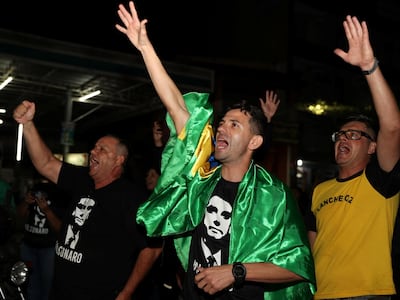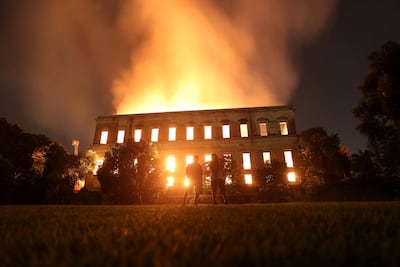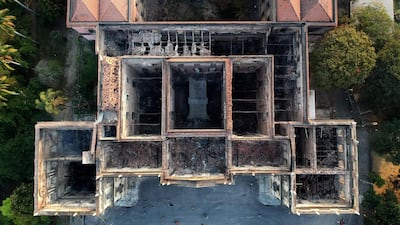From lace bugs and mummies to fossils and indigenous ceramics, it was Latin America's largest museum collection. Collected over 200 years, the 20 million artefacts in Brazil's National Museum represented a vast trove of cultural and scientific treasure. But not everyone in Brazil is mourning its destruction in a fire that razed the museum in Rio de Janeiro on September 2.
“It’s already burned down, what do you want me to do about it?” asked Jair Bolsonaro, the far-right populist politician leading the polls ahead of Brazil’s October 7 presidential election.
Critics fear that, if elected, he would not do much to restore the museum, the world-class university courses once taught there, or to help any of Brazil’s other ailing public institutions. Mr Bolsonaro likes to be compared to Donald Trump but a more apt comparison might be French far-right leader Jean Marie Le Pen. The Brazilian was never a businessman as Mr Trump was, and his family is involved in the country's far-right politics, like Mr Le Pen in France.
The man who could become leader of the world’s fourth largest democracy is a former army captain and politician for the conservative Social Liberal Party. His political career until now has been largely distinguished by a string of misogynistic, homophobic, and racially charged remarks that have had columnists wondering whether he might be the world’s most repulsive politician. He told a Brazilian congresswoman that she "did not deserve to be raped", said that he would be "incapable of loving a gay son", defended the use of torture, and has characterised blacks descended from slaves as lazy and not “fit for procreation”.

But his popularity has risen as he has exploited public fury over crime, corruption and a crumbling economy. An evangelical Christian and recent convert to economic liberalism, Mr Bolsonaro, 63, sees little value in investing public money in scientific and cultural institutions.
Weeks before the fire, Mr Bolsonaro made headlines by criticising art exhibitions he deemed immoral. "We have to gun down the creators of this exhibition," Mr Bolsonaro said of a show which discussed homosexuality.
His opponents hoped his comments on the fire at the museum – a beloved institution – would dent his popularity. Instead his supporters rallied.
“Good riddance, nobody went there anyway,” said Joao Vieira, a Rio pensioner.
“Brazil shouldn’t spend money on museums anyway, they should all be private,” said Helena Freitas, another Bolsonaro supporter.
“I never went and I don’t think anyone will miss it,” said Orlando Carlos.

Museum administrators, initially hopeful of post-tragedy relief from the federal government, are now fearful.
“I was shocked to see how proud some people were of their own ignorance,” said Roberto Lehrer, the dean of Rio’s federal university, which maintains the university’s budget. “We were never a priority for any government, but we were just shocked at the hatred we have received from some, as if the museum should never have existed. It is as if Brazil abandoned its history because of elections.”
Mr Bolsonaro’s adversaries, who have all expressed sorrow over the loss of the museum, have promised to invest more in the preservation of historic sites and state-owned cultural institutions. One of them will most likely face off against the far-right candidate in a run-off vote on October 28.
__________
Read more:
'Luzia died in the fire': Brazil's first human a 'priceless' loss from Rio museum blaze
Destroyed museum spoke to the wider human story
The West’s desire for antiques has turned museums into temples of loot
__________
Even before the fire, the museum had suffered from decades of neglect. Its budget was slashed repeatedly in recent years to just $1.7 million. By comparison, the British Museum, which possesses half the collection of its Brazilian counterpart, has a government budget of $18.3m, nine times that of the National Museum of Brazil. The ageing building suffered from leaks and termite infestations – and crucially had no sprinklers. There were plans to move to a new site but it did not have the funding to do so. Administrators spent three years fundraising to celebrate the museum's 200th anniversary in May but even with businesses receiving tax breaks for donations, only $250,000 was pledged.
In a country with a $1.6 trillion economy, it may seem strange that the museum’s paltry budget has become an election issue. “This is our country’s new culture wars,” said singer Tico Santa Cruz, who is also one of Brazil’s most known cultural agitators.
"The only thing this fire had to with the election was showing we care little about our past. That’s why some voters say there was never torture, there was never political persecution during the military dictatorship."
Santa Cruz was referring to the widespread human rights abuses under Brazil's military dictatorship between 1964 and 1985, which Mr Bolsonaro has whitewashed.

That Brazil losing a large part of its heritage in a fire could become such a divisive issue is an indication of the current depth of polarisation in the country, according to Carlos Melo, a political science professor at Insper University in Sao Paulo. “For our new right-wing to show they are different from the old guard, they need to use culture as a tool," Prof Melo says. "This fire was just one of the first manifestations of that phenomenon, we will see that for a long time.”
Days after his comments on the museum, Mr Bolsonaro was stabbed in the stomach by a fanatical opponent at a rally and hospitalised. He is expected to return to the campaign trail shortly. Despite his absence, the fiery Bolsonaro brand of populism continues to grow in the polls.

